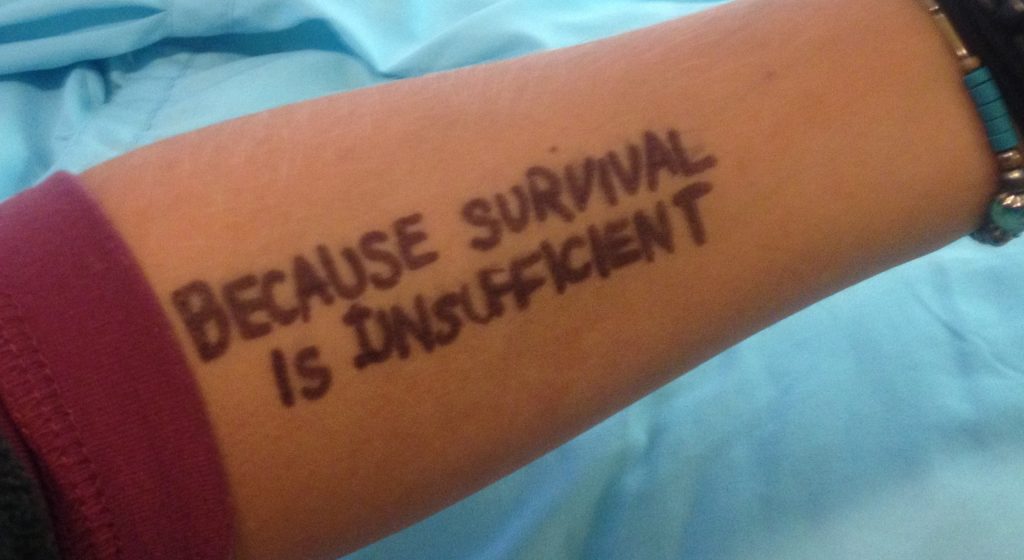Two years ago, I read a novel by Emily St. John Mandel, titled, Station Eleven. Actually, I did more than just read it. I immersed myself in it through discussion and participation in various special activities via Kenosha’s participation in the, National Endowment for the Arts’ Big Read. (For more information see, https://www.arts.gov/national-initiatives/nea-big-read )
Station Eleven, is all based on a global pandemic! The pandemic was labeled the Georgian Flu, and it was way worse than COVID-19. Way, way worse! The book explores, in words directly from the book, “the flu that exploded like a neutron bomb over the face of the earth and the shock of the collapse that followed.”
The, “collapse that followed,” refers to the fact that so many died, it left the world in a dystopian future. The novel gives a partial description:
“No more diving into pools of chlorinated water lit green from below. No more ball games played under floodlights… No more trains running under the surface of cities on the dazzling power of the electric third rail. No more cities… No more pharmaceuticals. No more certainty of surviving a scratch on one’s hand, a cut on a finger while chopping vegetables for dinner, a dog bite. No more flight… No more countries, all borders unmanned. No more fire departments, no more police. No more road maintenance or garbage pickup… No more Internet…”
This collapse was all due to the fact that so many died there just wasn’t enough people alive to facilitate all those things. Survivors went searching for areas that were still normal and soon learned there were no such places. Consequently, they began to settle into, “an archipelago of small towns.” The word “town” having been redefined to even include, “four or five families living together in a former truck stop.”
In spite of this collapsed world, and the time and energy devoted to food and shelter, one of the features of life is the occasional appearance of a traveling troupe performing a concert or a dramatic presentation. One of these troupes had a sign that said, “Because survival is insufficient.” One of the main characters has the same slogan tattooed on her arm.

The meaning and implications of, “because survival is insufficient,” is one of the themes of the novel. An online literary guide site called LitCharts (“From the creators of SparkNotes”) says, “The novel argues that humans, to be human, must do more than just survive; they must live.” The book displays survivors engaging in art, creativity, acts of kindness, and religion (in some cases bad religion) as they become people who not just surviving, but also people who are living.
As I alluded to above, COVID-19 is miniscule compared to the fictitious Georgian Flu of the novel. Nevertheless, for some, COVID-19 has driven us mentally into survival mode. It makes us feel like we’ve put, “living,” on hold while we simply survive. I say “Don’t!” Instead, embrace the philosophy that survival is insufficient.
Currently, it is temporarily true that you can’t live the life you’ve been living in the same way you been living it but that doesn’t mean you can’t live. No, you can’t go and dine out in your favorite restaurant but you could experiment with a new recipe at home. You can’t host a party in your home but you could host some friends or family in a Zoom meeting. (That’s right. The same Zoom you use for church, school, or work, you can use with your family and friends. “But I don’t know how,” you say. What better time to learn than right now!) Many libraries are currently closed but if you are like me, you have books on shelves in your house that you planned to read but never got around to. You can’t go visiting, but you can make old-fashioned phone calls or even write older-fashioned letters. Or maybe there’s a subject you want to research; the internet didn’t go away. Now is not a good time to join a gym but it’s an excellent time to develop a habit of walking (or running or cycling). This list could go on…
And of course, there’s spirituality. You can spend more time than normal reading your Bible and praying. Also, a vast number of churches have sermons and Bible lessons available on line, way more than ever before. Remember, being, “stuck at home,” isn’t nearly as extreme as spending forty days fasting in the wilderness as Jesus did. And there is no way that Jesus wasted that time. He emerged strengthened and ready for his mission which he then began in earnest. Perhaps in like manner you can use this time praying, reflecting, and discerning for a variation of a New Year’s Resolution. That is, what might God want you to resolve to do differently once this is over? That’s something to prayerfully explore with God.
Regardless of how COVID-19 is impacting you, remember that, “survival is insufficient.” Resolve to really live. Even now!
